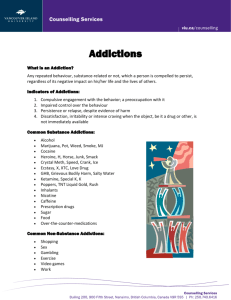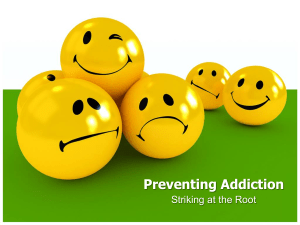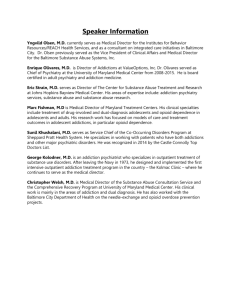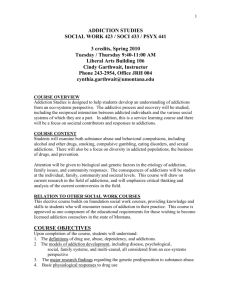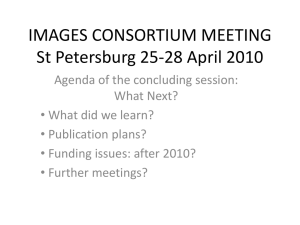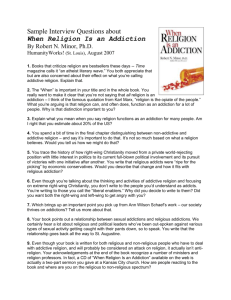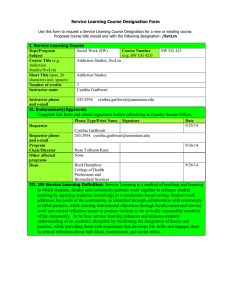Service Learning Course Designation Form
advertisement
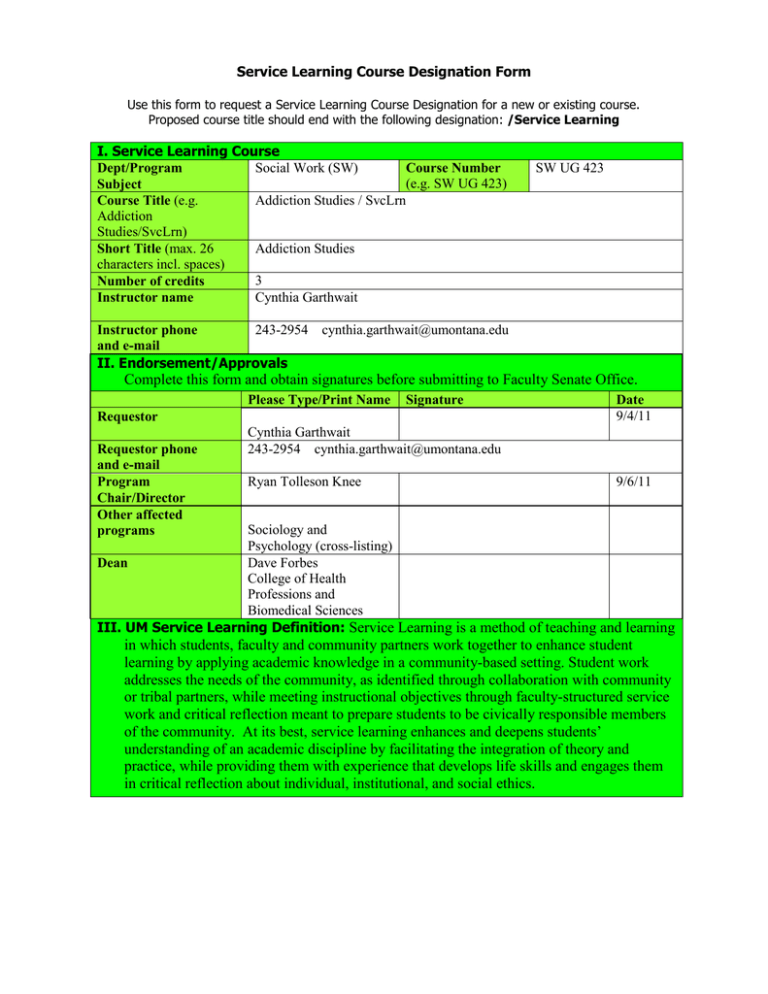
Service Learning Course Designation Form Use this form to request a Service Learning Course Designation for a new or existing course. Proposed course title should end with the following designation: /Service Learning I. Service Learning Course Social Work (SW) Dept/Program Course Number (e.g. SW UG 423) Subject Course Title (e.g. Addiction Studies / SvcLrn Addiction Studies/SvcLrn) Short Title (max. 26 Addiction Studies characters incl. spaces) 3 Number of credits Cynthia Garthwait Instructor name SW UG 423 243-2954 cynthia.garthwait@umontana.edu Instructor phone and e-mail II. Endorsement/Approvals Complete this form and obtain signatures before submitting to Faculty Senate Office. Please Type/Print Name Signature Requestor Requestor phone and e-mail Program Chair/Director Other affected programs Date 9/4/11 Cynthia Garthwait 243-2954 cynthia.garthwait@umontana.edu Ryan Tolleson Knee 9/6/11 Sociology and Psychology (cross-listing) Dave Forbes Dean College of Health Professions and Biomedical Sciences III. UM Service Learning Definition: Service Learning is a method of teaching and learning in which students, faculty and community partners work together to enhance student learning by applying academic knowledge in a community-based setting. Student work addresses the needs of the community, as identified through collaboration with community or tribal partners, while meeting instructional objectives through faculty-structured service work and critical reflection meant to prepare students to be civically responsible members of the community. At its best, service learning enhances and deepens students’ understanding of an academic discipline by facilitating the integration of theory and practice, while providing them with experience that develops life skills and engages them in critical reflection about individual, institutional, and social ethics. IV.Service Learning Course Criteria The University of Montana-Missoula has established the following criteria for Service Learning courses. In order to receive the Service Learning course designation, a course must clearly exemplify all of the following criteria: Students in the course will provide a needed service to individuals, organizations, schools, or other not-for-profit or tax-exempt entities in the community. The service experience is directly related to the subject matter of the course. Knowledge from the discipline informs the service experiences with which the students are to be involved. Activities in the classroom will provide opportunities for students to actively reflect upon what they have learned through the service experience and how these experiences relate to the subject matter of the course. Reflection should be imbedded as course assignments and in-class time should be scheduled to do reflection – both should be clear on the syllabus. Reflection should incorporate discussion/assignments that help students understand the importance of meeting community needs through service and civic engagement in a democratic society. The course offers a method to assess the learning derived from the service. Credit will be given for the learning and its relation to the course, not for the service alone. Service interactions in the community will recognize the needs of service recipients and represent reciprocal partnerships between the campus(class) and community partner organization(s). Community partner(s) should have the opportunity to provide advice and feedback in class on the nature and value of the service performed by the students. Training (by the service agency) and preparation (by the course instructor) ensure that students perform service activities in a professional manner and that vulnerable populations are not harmed. Service options ensure that no student is required to participate in a service placement that creates a religious, political, or moral conflict for the student. In a 3-credit service learning course, students should be required to perform a minimum of 15 hours of community service per semester (i.e. 5 hours of service per academic credit.) Service hours may include hours spent in training, preparation, and direct contact with clients. V. Confirmation of Service Learning Course Criteria: Explain how this course meets each of the following criteria. Need for service: Describe the community- identified need and the nature of the service experience students will be involved in. Relation to course content: Describe how the service experience is related to the subject matter of the course. How do students apply their classroom learning in the service experience? Numerous community organizations, particularly non-profit organizations, have a need for volunteers to provide direct and indirect services to clients and populations at risk for addictions, those impacted by addictions, and those in treatment and recovery. Students can select a servicelearning experience from a list of approved sites or select their own in consultation with the instructor. A cooperative arrangement with the Flagship Program in the Missoula school district allows for students to mentor children and youth at risk, as well as to participate in or lead meaningful activities aimed at building resilience and addressing risk in young people. Examples of other opportunities could include: (1) working with UM’s Self Over Substance program by providing education and facilitating student groups, (2) preparing materials and/or educating parent groups about teenage substance use prevention, (3) educating a high risk group about smoking, gambling, eating disorders, and substance abuse, (4) implementing a prevention program on campus such as a UC table or a DUI goggles project (in conjunction with law enforcement authorities), (5) prepare a recovery support kit for a real person in recovery that will help them avoid relapse. All service-learning activities are tied to the course objectives, text-book readings, other assignments (abstinence/acquisition project, visit to 12 step program), and these linkages are repeatedly reinforced in classroom discussions and assignments. Students are prepared for their experiences through inclass training, and are asked to reflect orally and in writing about the ways in which they have applied their learning. Specific course objectives which are integrally tied to the service-learning project include (1) learning about models of the development of addictions, (2) current research, (3) assessment and treatment options and effectiveness, (4) family dynamics, (5) values and ethics related to addictions. Reflection: What opportunities are provided in the classroom for students to reflect upon what they have learned through their service experience? How is service placed within the broader context of civic engagement and service to others? Assessment: What method(s) are used to assess the learning derived from the service experience? Reciprocity: How do community partner(s) provide advice and feedback on the nature and value of the service performed? Training: What training and preparation will be provided to assure that that students perform their service activities in a professional manner and that vulnerable populations are not harmed? Service options: What service options exist to ensure that no student is required to participate in a service placement that creates a religious, political, or moral conflict? As written in the course syllabus, students are required to reflect on their experience and learning orally and in writing. Specific classroom discussions focus on this integration of theory and practice, and students are asked to tie this learning into the journals they write for their abstinence / acquisition project. In addition, a final report and reflection is required (either oral or written) and is guided by specific questions that will help students examine their own learning and demonstrate their broadened understanding of the need for ongoing civic engagement. Discussions in class will also focus on the impact of such civic engagement, including the current research on both learning and service components of student civic engagement. Students are evaluated on the contributions they make to classroom discussions. Their journals on the abstinence project’s relation to the service-learning project are read and graded. Their final reflection reports are graded. In addition, feedback from community partners is incorporated into the assessment of student learning and performance. Flagship Program staff complete a written evaluation on the individual performance of each student volunteer. In other placements, the instructor interacts with professionals who supervise students and seek feedback on their performance. Classroom time is spent on professionalism in their projects and behavior, as well as on anticipating problems and addressing them. Classroom time is also spent preparing students for the individual expectations of their projects. The instructor also addresses individual student questions individually, and the teaching assistant maintains ongoing email contact with each students. Classroom time is spent on the issue of vulnerable populations, such as the at risk youth served by Flagship Program and those in recovery programs. Topics addressed in this preparation include: confidentiality, ethical treatment, when to report possible abuse, and how to seek supervision when needed. All students have a choice about the servicelearning project they want to pursue, and if they want to design their own meaningful experience, this can be done in conjunction with the instructor. Number of service hours required: How many 15 hours. Activities include but are not limited to the following: (1) completing Flagship Program training and then mentoring at-risk youth or participating in or leading Flagship activities for at-risk youth, (2) preparing a recovery kit for a person in recovery by researching the effectiveness of treatment and then incorporating those concepts into the preparation of a recovery kit specifically designed for an individual in recovery, (3) participating in training for a program such as UM Self Over Substance program or Community Care and then providing services such as education and group facilitation to college and high school populations, (4) design an outreach / education program for a particular population on an addictions topic such as gambling, smoking, or eating disorders and implement this education / prevention program. VI. Community Partner Information: Provide information on the organization(s) that will provide service placements for students in this course. Name of Agency/Organization(s) Flagship Program, Self Over Substance, Community Care, Youth Homes Inc., Turning Point (outpatient treatment and recovery program), and others as identified Contact person name(s) Nicole Mitchell (Flagship Program) Mike Frost (Self Over Substance) Craig Krueger (Youth Homes Inc.) Mavis Vaillancourt (Turning Point) hours of service per semester are students required to perform? Provide detailed description of the service activities to be performed. Contact person(s) phone and e-mail Others as identified by instructor Nicole Mitchall 532-9827 nmitchell@wmmhc.org Mike Frost 243-4711, mike.frost@umontana.edu Craig Krueger 721-2704 ckrueger@youthhomes.inc Mavis Vaillancourt 531-4145 mvaillancourt@wnngc.org VII. Syllabus: Paste syllabus below or attach and send digital copy with form. The syllabus should clearly indicate that this is a service learning course and it should include the UM Service Learning Definition as text within the syllabus. The syllabus should also demonstrate how the above criteria are satisfied. For assistance in preparing a service learning course syllabus, see http://www.compact.org/syllabi/ or contact Andrea Vernon, Director of the Office for Civic Engagement: andrea.vernon@umontana.edu. VIII. Copies and Electronic Submission: Submit approved original, a copy, and electronic file to the Faculty Senate Office, UH 221, camie.foos@mso.umt.edu. ADICTION STUDIES SOCIAL WORK 423 / SOCI 433 / PSYX 441 3 credits, Spring 2012 Tuesday / Thursday 9:40-11:00 AM Liberal Arts Building 106 Cindy Garthwait, Instructor Phone 243-2954, Office JRH 004 cynthia.garthwait@umontana.edu COURSE OVERVIEW Addiction Studies is designed to help students develop an understanding of addictions from an eco-systems perspective. The addictive process and recovery will be studied, including the reciprocal interaction between addicted individuals and the various social systems of which they are a part. In addition, there will be a focus on societal contributors and responses to addictions. COURSE CONTENT Students will examine substance abuse and behavioral compulsions, including alcohol and other drugs, smoking, compulsive gambling, eating disorders, and sexual addictions. There will also be a focus on diversity in addicted populations, the business of drugs, and prevention. Attention will be given to biological and genetic factors in the etiology of addiction, family issues, and community responses. The consequences of addictions will be studies at the individual, family, community and societal levels. This course will draw on current research in the field of addictions, and will emphasize critical thinking and analysis of the current controversies in the field. SERVICE-LEARNING COURSE DESIGNATION Service Learning is a method of teaching and learning in which students, faculty and community partners work together to enhance student learning by applying academic knowledge in a community-based setting. Student work addresses the needs of the community, as identified through collaboration with community or tribal partners, while meeting instructional objectives through faculty-structured service work and critical reflection meant to prepare students to be civically responsible members of the community. At its best, service learning enhances and deepens students’ understanding of an academic discipline by facilitating the integration of theory and practice, while providing them with experience that develops life skills and engages them in critical reflection about individual, institutional, and social ethics. RELATION TO OTHER SOCIAL WORK COURSES This elective course builds on foundation social work courses, providing knowledge and skills to students who will encounter issues of addiction in their practice. This course is approved as one component of the educational requirements for those wishing to become licensed addiction counselors in the state of Montana. COURSE OBJECTIVES Upon completion of the course, students will understand: 1. The definitions of drug use, abuse, dependency, and addictions. 2. The models of addiction development, including disease, psychological, social, family systems, and multi-causal, all considered from an eco-systems perspective 3. The major research findings regarding the genetic predisposition to substance abuse 4. Basic physiological responses to drug use 5. The use of assessment criteria and tools 6. Treatment models including self help, behavioral, family systems, disease, and innovative programs 6. Family dynamics of chemical abuse, including co-dependency 7. Current controversies in the field of addictions, including the harm reduction model versus the disease model 8. The effects of addictions on special populations, including diversity in age, ethnicity 9. The continuum of responses to addictions, from prevention to treatment to law enforcement / control 10. The impact of one’s values, attitudes, and life experiences on one’s view of addiction 11. How to identify and examine the ethical dimensions of addictions REQUIRED READINGS Chemical Dependency: A Systems Approach by C. Aaron McNeece and Diane N. DiNitto, 3rd edition, Allyn and Bacon, 2008. (1 copy on reserve) Selected chapters from Motivational Interviewing: Preparing People to Change Addictions by William R. Miller and Stephen Rollnick, Guilford Press, 2nd edition, 2002. (on reserve and ereserve. Password: SW 423) ASSIGNMENTS (1) ABSTINENCE OR ACQUISITION PROJECT AND JOURNAL (Journal due March 4) Starting on January 28, you are asked to abstain from a mood altering chemical / substance / food / activity for 30 days (January 28-February 26). The substance will be of your choosing, and can include alcohol, other drugs, nicotine, caffeine, sugar, or other similar substances. An activity can include gambling, spending money, watching television, spending time on the computer, swearing, etc. The purpose of your abstinence is to assist you in understanding what chemically dependent people face in treatment and recovery in this culture. You will also hopefully begin to assess the role chemicals play in your life. You are to choose something that will be a true challenge for you, as this will help you learn much more than if you chose something easy to change about your life. You are to keep a journal describing and reflecting upon your abstinence, with at least 3 entries per week describing your experiences, thoughts, feelings, successes and struggles. Each day’s entry should be one double spaced page, making 3 pages per week. You are to inform your instructor at the outset what substance you will be abstaining from, and you are to tell at least 2 significant persons in your life that you will be abstaining from that substance as well. You are to develop a plan for dealing with the difficulties of abstinence, including the possibility of relapse. In your journal, describe yourself and your environment in terms of such areas as the following: Your reasons for choosing this substance or behavior to abstain from or acquire Who you told about this experiment and who you look to for support Your daily experiences and feelings Your physical state (health, energy, sleep, nutrition) Your psychological state (motivation, emotions, coping skills, self-esteem, thoughts, insights, confidence, self-efficacy, emotional management) Your social life (social support, undermining, changes, friends, family, classmates, insights about others, reactions by others) Your spiritual state (choices, honesty, belief systems, ethics, practices, honesty, personal value system) Your environment (media, advertising, social mores) What you are learning about yourself What you are learning about your environment What you are learning about addiction What you are learning about behavior and attitude change Finally, write a 3 page double spaced conclusion about how this experience will assist you in understanding or working with chemically dependent people. Be specific. You will not be graded on your success or failure in abstaining, but on your growth in understanding yourself and of the dynamics involved in dealing with addictions. However, it is important to make your best effort to abstain for the full 3 weeks. Alternative Assignment Choose a behavior or habit that you wish to acquire. For three weeks, work at developing that habit or acquiring a behavior. Use the same reporting and journaling process as if you had chosen abstinence. Examples could be: starting a daily exercise program, meditation, eating healthy food, or other self care activities. (2) ATTENDANCE AT 12 STEP MEETING AND DISCUSSION PAPER (Paper due April 20) You are to attend one meeting of a 12 step group such as Alcoholics Anonymous, Gamblers Anonymous, Overeaters Anonymous, or Narcotics Anonymous. If you have already attended one of these groups, attend a type of group that you have never attended. Make sure that you are attending an open (not closed) meeting. Should someone ask, be honest about your reasons for being there. People are typically appreciative of your interest in the organization, but remember that you are there to respectfully observe, not interview participants. Above all, respect the anonymity of people you meet there. You may see people you know, and if so, respect their anonymity. Do NOT take notes or bring a tape recorder. Schedules of 12 step group meetings will be made available by the instructor. The discussion paper is to be a compilation of your field notes following attendance at the meeting, combined with your learning from the assigned readings and class discussions regarding 12 step programs. Begin with a short description: name of group, place, type of meeting, brief description of the demographic characteristics of the group, physical surroundings of the meeting, and atmosphere and tone. The remainder of the paper should focus on: Your personal reactions as an individual attending for the first time. What did you observe / learn about yourself by attending? Were you nervous? Why or why not? Did you have any stereotypes that were confirmed or shattered? What emotions did you experience? What social, psychological and spiritual principles of human behavior are the 12 step programs based on? How do they contribute to its success? Implications for your professional practice. Who do you think would benefit from such a group? How would you go about preparing a client for such a group based on your initial experience? Who might have a hard time participating in such a group? What do you think are the keys to the success of this approach? Integration of classroom materials with 12 step observations. How does this experience fit or not fit with information presented in class or read for this class? Compile your reactions into a 4-5 page paper. In addition, be prepared to discuss your findings and observations in class. (3) EXAMINATIONS (March 12, April 30) Two examinations will be given that focuses on both text material and ideas presented in class. Both examinations are a mixture of objective and essay questions. Both examinations are open book / open note format. (4) ATTENDANCE AND PARTICIPATION You will be expected to attend class regularly and contribute to class discussions. Come prepared for class, having read assigned readings and ready to discuss them. You will also be given the opportunity to interact with guest speakers. You will be graded on your attendance, and over 2 unexcused absences will significantly lower your grade. You are expected to give the instructor advance notice of any excused absences and to make up the work in advance if possible. (5) SERVICE LEARNING (Oral reports done the last week of class. Written reports due May 6). You are to donate 15 hours of volunteer service to a community organization which provides service in some area of addictions, whether it is in education, prevention, or treatment. An arrangement with the Flagship Program of the Missoula School District has been made to accommodate students enrolled in the course to work with elementary or middle school aged youth. A representative of the Flagship Program will come to class to discuss the ways in which volunteers can be used in the schools. A variety of alternate and meaningful service learning experiences can be arranged with the approval of the instructor, and a list of suggested service-learning opportunities will be provided. These can be tailored to specific areas of interest, majors, and career goals, as there are numerous opportunities in the community to provide a meaningful service while integrating this experience with academic concepts and professional skills. You are to inform your instructor of your choice by February 4. If you need assistance in choosing a service learning placement, consult with the instructor right away for ideas and assistance. At a number of points during the semester, you will be asked to reflect on your service-learning project in class. Classroom discussions focused on reflection of your experiences and integration of these experiences with classroom content will be scheduled throughout the semester. These oral reflections will help you in a variety of ways, including: Integrate academic concepts with real world applications of knowledge and skills Learn about a specific community-based addictions program and compare it with what is learned in the classroom about community programming Discover potential career paths within your major Identify your abilities and enhance them Identify your needs for additional knowledge and skill and address them Address issues of social policies and social justice related to your program and the needs it addresses in the community Learn about the relationship between prevention and intervention Learn from the experiences of other students in class In order to analyze and demonstrate your learning and growth through the service-learning project, the following reflection questions can guide you. What were your personal and professional goals for this project? What plan did you devise to reach those goals? What classroom information, concepts and knowledge helped you in this project? What else did you need to learn during this project? What theories and models of prevention and intervention did you observe and participate in? What did you learn about yourself as a person and a professional? What challenges and difficulties did you face, and how did you address them? What did you learn from these challenges? In what ways did your service-learning help you achieve the objectives for this course? How did this project dovetail with the other assignments in this course? You are also to make a verbal or written report (your choice) of your project during class at the end of the semester. A format for both will be provided by the instructor. This format will provide reflection questions for you to address about your learning and the value of your service overall to yourself and the community. Verbal reports are 4 minutes, and written reports are 4 doubled spaced pages. If you choose to write a report, it will be due on the last day of class. Classroom final reports will allow you to share your experiences with other students, help them learn from your project, and allow you to deepen your understanding of how knowledge about addictions is translated into an intervention in the real world. Samples of Service-Learning projects include: Flagship Program K-12 levels After-school activities (mentoring, tutoring, activities, interest groups) DUI Goggles Project (4-5 students) On campus Prevention / harm reduction project UC Table Addiction-related Education / prevention S.O.S. (UM Self Over Substance Program) Peer education Big Brothers and Big Sisters Mentoring children and adolescents Presentation in middle / high school setting regarding Smoking, drinking, drugs, eating disorders Prevention / education Recovery Support Develop recovery kit for a real person in recovery Course Grading Class attendance and participation Abstinence / acquisition project 12 step group paper Examination 1 Examination 2 Service learning project 100 points 200 points 100 points 100 points 100 points 200 points _____ 800 points possible A 720-800 points (90-100%) B 640-719 points (80-89%) C 560-639 points (70-79%) D 450-559 points (60-69%) F 0-449 points (0-59%) Plusses and minuses may be used when grading. TOPICS, READINGS AND ASSIGNMENTS BY WEEK January 26 Introduction and Definitions January 28 Theories / Models of Addiction Introduction to Service-Learning Options McNeece 1 “Definitions and Epidemiology of Substance Use, Abuse, and Disorder: MeNeece 2 “The Etiology of Addiction” Begin abstinence / acquisition project February 2 Disease Model of Alcoholism February 4 Biological and Genetic Factors in Addictions McNeece 3 “The Brain Biology of Drug Abuse And Addiction” McNeece 4 “The Physiological and Behavioral Consequences of Alcohol / Drug Abuse” February 9 Service-Learning / At Risk Youth February 11 Assessment McNeece 5 “Screening, Diagnosis, Assessment and Referral” Miller 1 “Why Do People Change?” Miller 2 “Ambivalence: The Dilemma of Change” Miller 3 “Facilitating Change” Miller 4 “What is Motivational Interviewing?” February 16 Treatment McNeece 6 “Treatment—the System of Care” Miller 5 “Change and Resistance: Opposite Sides of the Coin” Miller 6 “Phase I: Building Motivation for Change” February 18 Motivational Interviewing February 23 Relapse February 25 Compulsive Gambling Gamblers Anonymous speaker March 2 Smoking / Nicotine March 4 Eating Disorders Abstinence / acquisition journal due March 9 Media and Societal Influences on Addictions “Slim Hopes” video March 11 Examination #1 March 16 Sexual Addiction March 18 Family Systems McNeese 10 “Family Systems and Chemical Dependency” March 23 Gender Issues in Addiction McNeece 15 “Gender and Drugs: Fact, Fiction, and Unanswered Questions: March 25 Native American Issues in Addiction McNeece 11 “Ethnicity, Culture and Substance Abuse Disorders” March 30 Spring Break April 1 Spring Break April 6 Sexual Orientation and Addictions McNeece 12 “Substance Abuse Treatment with Sexual Minorities” April 8 Fetal Alcohol Syndrome Fetal Alcohol Syndrome Support Group April 13 Age and Addiction McNeece 9 “Treating Chemically Dependent Youth” McNeece 14 “Alcohol and Drug Use Among Elders” April 15 Dual Diagnosis McNeece 13 “Substance Use Disorders and CoOccurring Disabilities” April 20 Regulation of Drugs McNeece 8 “Regulating Drugs and Their Consequences” 12 step paper due April 22 Prevention McNeece 7 “Preventing Alcohol and Drug Problems” April 27 Professional Issues / Ethics in Addictions McNeece 16 “Chemical Dependency: Current Issues And Future Prospects” April 29 Examination #2 May 4 Service Learning Project Oral Reports May 6 Service Learning Project Oral Reports Service Learning Written Reports
